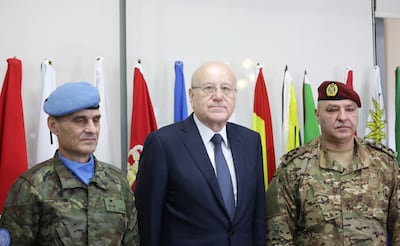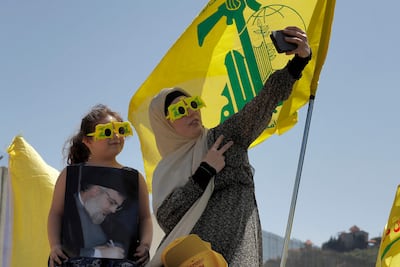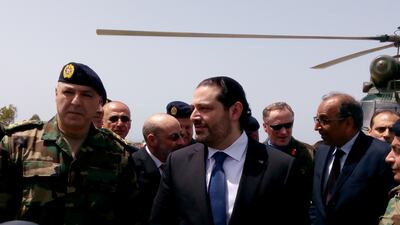Lebanon has been without a president since the end of October, when Michel Aoun’s term ended. Since then, the political forces in the country have failed to reach a consensus on a successor. This is necessary, since parliament elects presidents in Lebanon, and what emerged from the elections in May is effectively a hung parliament.
Broadly speaking, there are two major parliamentary alignments. One is led by Hezbollah, and includes the Free Patriotic Movement (FPM), led by Gebran Bassil, Mr Aoun’s son-in-law, and speaker of parliament Nabih Berri’s bloc. The other alignment, which tends to oppose Hezbollah, despite notable exceptions, that includes the mainly Christian Lebanese Forces Party, the Kataeb Party, the bloc led by Druze leader Walid Joumblatt, and a number of Sunni parliamentarians close to former prime minister Saad Hariri. A much more amorphous bloc of independents fluctuates between the two.
Parliament has held almost a dozen electoral sessions since October, to no avail, as the search for a successor to Mr Aoun seems frozen. Yet that assessment may not be so accurate. Behind the scenes a search is going on for a new president, one who would benefit from a consensus inside Lebanon, but who would also build trust regionally and internationally.

One of the countries engaged in this effort, according to analysts and diplomats in Beirut, is Qatar, which, with France, has been trying to build Arab backing for a candidate. The Qataris have reportedly told their interlocutors that their preference is for the election of the army commander, Joseph Aoun. Proof of Qatari interest came recently, when they invited Mr Aoun to Doha, before hosting another presidential hopeful, Mr Bassil.
While the commander discussed military issues with the Qataris, there was little doubt that his visit was tied to the presidency. Mr Bassil’s trip, in turn, could have been aimed at facilitating his approval of a Joseph Aoun presidency, although at this stage much remains unclear.
Qatar’s role is hardly fortuitous. In 2008, the Qataris were instrumental in negotiating a compromise among Lebanese political factions after armed clashes in and around Beirut. At the time, this compromise, known as the Doha Agreement, involved paving the way for the election of then army commander Michel Suleiman as president and giving Hezbollah and its allies veto power in the cabinet, which they had demanded.

That explains why Qatar has maintained the trust of Hezbollah, and why the party will take seriously any deal on the presidency proposed by the Qataris. At the same time, Qatar is seen as instrumental in persuading the Saudis of any agreement reached in Lebanon.
This led one Arab diplomat, cited by a Lebanese newspaper, to speak about Joseph Aoun’s invitation to the emirate: “This invitation, with this timing, is undoubtedly a political message that aims to say that General Aoun’s candidacy for the presidency benefits from Qatar’s support, but also that of France, the United States, Egypt, and Saudi Arabia.”
However, those remarks may be slightly ahead of the curve. If we assume the initiative to promote the army commander is serious, and all the signs are that it is, there are several hoops he will have to go through before there is a concurrence of views around his candidacy. And for the time being, nothing indicates we have reached that stage yet.
Most importantly, Mr Aoun will need to gain the approval of Hezbollah. The party is of two minds on the commander. On the one hand, it has co-ordinated closely with the military over the years, generally without incident. At the same time, Mr Aoun has good ties with the Americans and other western countries, which makes Hezbollah uneasy. Last year, the army was also instrumental in preventing the advance of armed gunmen affiliated with Hezbollah and the allied Amal movement towards Christian areas, in which several gunmen were killed.
Yet, approval of Mr Aoun may bring advantages. Hezbollah, through its media mouthpieces, recently floated a quid pro quo, in which it proposed bringing in a new president, while the Saudis could appoint the prime minister. Little will come of that trial balloon, but it suggested that the party might be willing to concede something to the Saudis and their allies in Lebanon, when in the past it had strived to keep them out of national political life.
Hezbollah realises the economic situation in Lebanon will deteriorate further if the country remains isolated regionally. At a time when protests in Iran are continuing and a right-wing Israeli government is about to assume power, Hezbollah may not to want to face alone a perfect storm of crises that overwhelm it, making an opening to Arab states desirable.
There are other steps the commander will need to take to enhance his chances, including overtures to the two major Christian parties – the FPM and the Lebanese Forces – to guarantee that he has Christian legitimacy. This is required since the presidency is always held by a Maronite Christian. But the reality is that Mr Aoun’s future is playing out mainly at the regional level, between Hezbollah and Iran and Arab and western states. What they agree among themselves, the Lebanese parties will have to fall into line.


